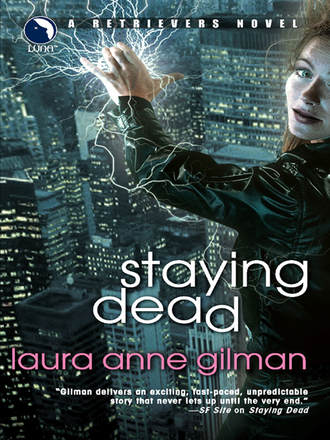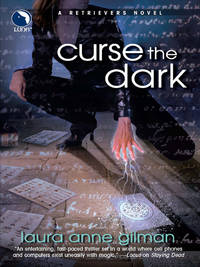
Полная версия
Staying Dead
It was for those three objects that the room existed.
In one corner, reaching from floor to ceiling, was a simple green marble pillar, three feet around and seven feet high. Etched onto its surface were crude symbols that hadn’t seen the light of day for over three thousand years.
In the opposite corner, an ebony wood pedestal was lit from above, highlighting a chunk of clear, unfaceted crystal that looked as though it had just been pulled from the ground, hosed down, and dropped onto that base.
And in the farthest corner, two men maneuvered a low wooden tray set on wheels into position. It was a mover’s trolley, its bed covered with a quilted pad similar to the kind used for fine furniture and grand pianos. Another pad wrapped up over a four-foot by six-foot square, and was sealed with heavy gray tape. The hard rubber wheels moved soundlessly on the floor, despite the weight they bore.
The two men were burly, but not brutish looking. One was perhaps forty, with graying hair cut short. The other was ten years younger, and completely bald. They wore simple white coveralls that had only one pocket in the left sleeve, too small to carry anything larger than a cigarette lighter. There were no names sewn over the chest: no logos, cute or otherwise on their backs.
They finished adjusting the trolley, and the younger man knelt by its side, producing a slender but sharp-looking pocket knife from his sleeve pocket, carefully cutting through the tape, peeling it away from the pad and unfolding the pad from its enclosed prize. About the length of a small bench, the marble’s silvery-gray surface was marked and pitted, making the once-glossy surface look dull and battered. A smaller rectangle on the top surface looked as though it had been carved out and then filled in with concrete.
“All this, for that?”
The older man sounded disgusted. No one else was in the room, but his partner cast a worried look over his shoulder, as though expecting someone to appear there and overhear the criticism.
“If the owner says it’s art, it’s art,” he told his older companion firmly. “Let’s just get it settled, and get out of here.” Personally, the object gave him the creeps. Hell, the entire place gave him the creeps. But he was a professional, damn it. He was going to act like one.
A low matte black platform, installed when the room itself was built and unused until now, waited to receive its burden. The two men took wide canvas slings that had been hung on the trolley’s handle, and fitted them around two corners of the marble block. The younger man’s hand brushed the surface of the stone where the cement plug was, and he shuddered involuntarily, stopping to look down at his hand as though expecting to see a spider, or something else less pleasant on top of it.
“Will you stop that?” the other man snapped. “Concentrate on the job. I don’t need you getting sloppy and dumping it all on me.”
Stung, his co-worker glared at him, shook his hand out unobtrusively, as though to get feeling back into a sleeping limb, and counted to three under his breath, just barely loud enough to hear. On three, they heaved, and with a seemingly effortless movement and a pair of grunts that destroyed that illusion, the stone settled into its new home.
“That’s strange. Wonder if it’s been hollowed out? I thought marble that size would be heavier.”
“Don’t complain, man, don’t complain! And for God’s sake, don’t ask,” the younger man begged, his eye closed against the sweat that was rolling off his forehead. “We on the mark?”
The stone was square on its base, with a full three feet between it and the walls on two sides; room enough for a person to walk around it, should they so desire.
“Yep,” the other workman replied. “Perfect, as always.” It was as close to a compliment as they would get from anyone. They were hired via the company’s Web site, informed of the details by e-mail, paid by wire transfer, and never knew what any of it was all about. And they liked it that way. Some folk you just didn’t want to know any more about than you had to.
Their work completed, the two rolled up the quilted pad and tossed it onto the trolley, pushing it out ahead of them as they left. They didn’t look again at the object they had delivered, nor did they pause to consider the other two objects already in place.
No one waited at the door to show them out; they had been given their instructions before arrival, when they were assigned the job. They would walk down the bland, security-camera-lined hallway they had entered through, down a flight of stairs, and follow a row of lights through a basement maze that would deposit them through a four-inch-thick metal door in a ten-foot-high wall that ran along an unpaved country road. A livery car with darkly-tinted windows waited there to take them back to the city, where they would be dropped off without once having seen another person.
Their employer wanted his privacy. They were paid well enough not to wonder why. And the legalities of what they had done never entered their minds at all.
When the last echoes of the workmen’s feet had faded into silence once again, silence reclaimed the building. In another wing, a door opened, and footsteps sounded, walking calmly, with no apparent haste or urgency, the owner of all within those walls. Occasionally the walker would pause to admire a painting, or caress a sculpture, but for the most part the priceless objects were accorded no more attention than the carpet underfoot, or the ceilings above.
Eventually, the door into the white room was pushed open, and the owner of the house entered, walking with those same unhurried strides to the corner holding the newly-installed fixture. He paused in front of it, cataloguing every detail and comparing it to his expectations.
“You’re not much to look at, are you?”
The slab of stone didn’t respond to the voice.
“But they do say, you can’t judge something by its looks. It’s not what’s on the outside that counts, after all, but the inside. Isn’t that right?”
The figure knelt by the cornerstone, trailing one well-manicured finger along its rough surface, shivering pleasurably at the sensation. “But no matter. No matter. I know what you are, what you were. And all that really counts is that you’re mine, now.”
four
“Hey. Babe. Let me in!”
The very first time Wren had met P.B., she had giggled. The second time, she had screamed. By now, when he showed up on her fire escape, she merely flipped the safety latch on the kitchen window, and let the demon come in.
“Thanks. Man, this neighborhood of yours is totally not safe anymore. Some loon started chasing me down the street, yelling something about a cleansing to come. You got much business with Holy Rollers, Valere?”
She shrugged. “You must just bring it out in ’em, pal. You got something for me?”
P.B. shook out his fur, a faint mist coming off him. “Damn, I hate rain. Makes my skin itch.” He took a battered-looking manila envelope out from the messenger’s bag strapped across his barrel-shaped chest and tossed it on the table, then scooped up a slice of the remaining pizza. The slice was halfway gone by the time Wren had opened the envelope. She sighed, and shoved the rest of the grease-lined box closer toward him. “Here. Eat. You’re looking frail.”
The decidedly unfrail P.B. snorted, but didn’t hesitate in devouring his first slice and reaching for a second one. “I get first prize for speed?” he asked in between slices, referring to the material in her hand.
“As always,” she said, licking one finger and using it to sort through the pages, scanning the delicate copperplate that seemed so incongruous coming from P.B.’s clawed hands.
P.B.’s real name was all but unpronounceable. The nickname came from an inauspicious moment back in the early days of their acquaintance, when an innocent bystander had been heard to shriek, “Oh my God, it’s a monster!” To which Wren, somewhat short-tempered at the time, had snapped back, “No, it’s an effing polar bear!” The description had been apt, and the nickname had stuck.
P.B. wasn’t her only source, but he was one of the best. Certainly the most reliable. Demons mostly made their living as information conduits, there not being much of a job market for them outside of bodyguarding and freak-show gigs. There wasn’t anything that one of them didn’t know, or couldn’t find out, and what one of them knew, another would hear, sooner or later.
Sooner, if the money was right. And they didn’t play politics: you got what you paid for, no matter who—or what—you were. It was refreshing, in a disgustingly capitalistic pig kind of way. She wished more of the Cosa worked that way. But no, the ineptly-named angels had their endless feuds, and the various fatae-clans their more-special-than-thou attitudes, and humans—sometimes she thought humans were the worst of all, with the mages and their rules and regulations and Shalt Nots worse than Sunday School for fear of someone breaking rank and having a little fun. “Someone” in the mages’ case mostly being the lonejacks, the Talents who refused affiliation. Unions and scabs, Sergei had described it, but it wasn’t that simple, really. Everyone had a different reason for going lonejack.
And, tossed into that mix, always the snarling between the races, like they weren’t all in it together, more or less. But some people—humans and fatae—just couldn’t handle the idea of something shaped or colored a little differently walking, talking and working alongside their precious selves. Wren didn’t have much patience with that. You do your job, stay out of her way, she didn’t much care if you lived in brimstone or used your hind paws at the dinner table.
Sometimes, she thought it would have been a lot easier being Null. Then she watched the Suits scuttle to work every morning, hustling for a window office, and decided she was happy where and what she was.
P.B. burped, the sound like baritone chimes rising from his rotund stomach. “So what’s the job?”
She just looked at him, a wealth of disbelief in her expression. He stared back, his flat, fur-covered face blandly innocent. Anything she shared with him without a for-hire agreement would be sold to his next client before she’d had a chance to act on it herself. Not in this lifetime or the next three, pal.
“Right. Don’t tell me anything, just send me out to fetch like a dog….”
She considered responding, then decided that it really wasn’t worth the effort. It was enough that she wasn’t pitching him out the window already.
Wren had only met three demons in the flesh in her lifetime—that she knew about, anyway. Looks varied wildly, and she was told that some of them could pass for human, if you weren’t looking carefully. The three she had encountered weren’t those kind. And of those three, P.B. was the only one she could deal with for more than a few minutes at a time. It wasn’t that she was prejudiced; she simply couldn’t handle the relatively high voltage most of the full-sized demons emitted, like some kind of ungrounded magical wire that set her teeth on edge. Fatae—the elves and piskies and whatnot—were, by contrast, easy on the nerves. And angels never hung around long enough to do more than freak you out.
For a few moments, the only sound in the kitchen was P.B.’s jaws chewing crust, and the scritching-soft noise of paper against paper as she read what he had brought her. Finally she reached the last page, and shook them back into order and replaced them in the envelope, folding the metal closure back down again. Names, jobs, capabilities…P.B. had done his usual bang-up job of getting exactly what she needed. Some of the names on the list were familiar, in the heard-about-them kind of way.
And one was all too familiar, in a gut-clenching way. She forced herself not to focus on it. All the names were equal possibilities right now. Don’t jump to conclusions. Conclusions without facts get people killed, possibly even her own very important self. File it, Valere. File it and deal with it later. When you’re alone.
“Thirteen names?” She raised an eyebrow at the fur-coated being now lounging in her other kitchen chair.
He belched, then shrugged. “Lotsa folk interested in your boy,” he said unapologetically. “He’s made himself some enemies. And those’re just the ones who have a profile with us.” Us being the entire magic-using community, the Cosa Nostradamus. Human and nonhuman alike. We might squabble amongst ourselves, often to the point of a passing wave of bloodshed, but in the end it was always us against them—“them” being what her long-gone mentor used to call Kellers; the Nulls, who were mostly blind and deaf to what was around them. Not much love lost there. To some of the Cosa, her working with Sergei on an equal footing was betrayal. He wasn’t too fond of them, either.
P.B. went on. “Probably lots of otherwise upstanding humans who hate his guts too.”
“What, he kicks old ladies and molests farmyard animals?” She’d gotten info on the client, but it was all public relations bullshit, not anything actually helpful. Sergei usually did a full write-up highlighting anything she needed to know, but this looked like a time-of-urgency kind of deal. Besides, he was the client, not the mark. They didn’t ask too much about the clients.
“Nah.” The demon cleared a piece of cheese from between his serrated teeth and flicked it into the garbage can. “Sounds like he gets his jollies the old fashioned way—with money. Preferably other people’s money, which he then turns into more money for himself. Real power-hungry, in the nasty-with-it way.”
Wren shrugged one shoulder, the tilt of her head conveying supreme indifference. “Most people with power are, that’s why they get to stay on the top of the predator heap. Anything I don’t already know?”
“Yeah. He’s apparently in real bad odor with the local wizzart’s gathering.”
“Wow.” Crossing wizzarts took serious guts. Or a total lack of brains. Possibly both. Unless of course he didn’t know what he was doing. If he only knew about the public face the Council sold…. Wizzarts weren’t exactly talked about outside the Cosa. Not too much inside it, either, truthfully. Mention not, see not, become not.
In fact, “gathering” was an ironic term to refer to wizzarts overall. The only time you got more than two wizzarts gathered anywhere was if they were all using the bathroom. And even then most of them would rather burst a bladder than share space with their own kind. And they weren’t much sweeter on other humans. Most wizzarts didn’t want to live within a hundred miles of another person. They were all crazy, chaos-ridden by taking too much current into their brain. From what little she’d been able to learn, the entire human race made them feel like she did around P.B., and twice that for another of their kind. It almost gave her some sympathy for them.
Not much, though. Last time she dealt with a wizzart, he’d tried to throw her over a cliff.
“Nice. And the Council?”
Dangerous or not, Wren would take a wizzart over a Council mage any day. Mages—cold, calculating bastards that they were—made her feel like she needed to take a bath after talking to one. And scrub hard.
“Street rumor is he stiffed ’em once, but managed to squirm out of retribution. No word on how, and believe you me there are folks who want to know that little trick, if it’s true.” The demon extended one three-inch-long claw and dug into the thick white fur on his neck, sighing in satisfaction when he hit the itch.
Wren watched in amusement. P.B. looked like an escapee from some demented toy shop, four feet of thick white fur and button-black nose offset by four sets of lethal claws and a voice that could scrape tar off the highway. But if the initial impression was of a cuddly bear, it was his eyes that were the giveaway to his true nature: oversized and pale red, with pupils that were slitted like a cat’s. Occasionally, he would don a hat and trench coat, which made him look like a diminutive Cold War-era spy, but more often than not he wore a pair of jeans, and not much else. She didn’t ask how he managed to get around in public like that without, as far as she could tell, the slightest bit of Talent beyond his own demon nature, and he didn’t volunteer the information. Professional courtesy, such as it was.
“That it?” she asked, indicating the material.
He nodded. “That’s it.”
“Great.” Her tolerance level had reached its breaking point and she was starting to get a headache. “Sergei will do the usual deposit. Now get out.” She was already reaching for the kitchen phone, her back turned to him when she added, “And leave the rest of the pizza.”
“Spoilsport,” he muttered, but left the box untouched. He also left the window open, in petty retaliation, and the sounds of an argument from the apartment below floated up to her over the pad-clatter of his clawed feet on the fire escape.
A tenor: voice spoiled and high-pitched by anger. “And another thing, I don’t like the tone of your voice!”
Oh wonderful. The couple in 1B were on that rant again. She was convinced the landlord paid them to leave their apartment whenever prospective tenants looked at a place. That had been the last time she hadn’t heard them. They were either arguing, or having sex. And one rather memorable morning, they had managed to do both.
Wren held the phone at arm’s length, dialing Sergei’s number with her thumb as she leaned backward to shut the window. “I have enough drama in my own life, thank you very much. I don’t need yours too.”
“Yes?”
“Me again,” she said into the phone. “Take me out to dinner.”
There was a pause. Warily…“And I should do this because…?”
“Because you haven’t actually seen me in, what, ten days? Two weeks, maybe, and are worried that I’m not eating properly.”
Her partner snorted. She was joking, but there was some truth to it; she had forgotten to eat for two days once when she was on the job, and Sergei had totally freaked when he found out. “And the other, more convincing reason?”
Wren made a snarling noise that completely failed to impress him. She thought maybe once it had. Years ago.
“Look, Genevieve—” She rolled her eyes. He rarely used her hated given name, usually only when he wanted her to think he was pissed off about something. “I have other accounts, responsibilities which require my attention. I can’t just walk out when you whistle.”
Ooo, someone was pissy. Market must be down again. “Yeah, yeah, you’re a hotshot high roller. This is work stuff, okay? Do I have to remind you that I make you more on one job than all your other clients, thereby keeping you in your suits and toys, and that—as you’re so often telling me—if I don’t get the job done—I—and you—don’t get paid?”
Sergei made a noise that might have been a protest—or could have been suppressed laughter. You never could tell with Sergei, not even when he was sitting in the room with you. Part of his incredibly annoying charm, and why she was never bored around him.
As amusing as this game was, she didn’t want to risk frying the lines by talking too long. “Just get your well-dressed rear up here, okay? Seven-thirty, Marianna’s. And bring whatever info you have on the client’s business compadres, so I can cross-reference the players before I do something stupid.”
“Thought before action. What a refreshing novelty.”
“Oh, bite me,” she said rudely, and broke the connection before she could hear him laugh. She sat and looked at the phone for a few moments, smiling absently. He was a pain in the posterior, but he was her pain in the posterior.
An expensively upholstered chair crashed against an equally expensively-paneled wall, rattling the oversized photograph of the desert at dawn which hung there.
“Idiots! Incompetents!”
The topmost floor but two of the Frants building was split into nine offices around a center lobby. Eight of those offices were large, lush spaces with a commanding view of the city, with a slightly smaller office directly off and to the inside where each inhabitant’s administrative assistant sat. The ninth office was twice again as large, and three assistants guarded access like Cerberus at the gates of the underworld.
At that moment, two of the assistants were cowering in the bathroom, while the third tried to pretend nothing at all unusual was going on in her boss’s sanctum.
“Sir, we merely feel that it would be wisest—”
“Don’t!” Oliver Frants held one finger up in the younger man’s direction, his florid, freshly-shaven face turning an ill-omened shade of pink. “Do. Not. Tell. Me. What. To. Do.” Each word was bitten off with precision, as though his perfectly capped teeth were holding back longer, uglier words.
The three executives glanced at each other, uncertain what to say next. They were all in their mid- to late forties; healthy, well-groomed, impeccably dressed. The kind of people you would normally see at the head of a boardroom table, having highly placed people report to them.
But in here, they cowered.
“I will not abandon this building. I will not abandon any of my scheduled meetings. And I will. Not. Hide.”
He looked at them each in turn, until they dropped their gaze like chastened children.
“Sir?” The woman, Denise Macauley, had dredged up enough courage to speak. Frants smiled. She had been a particular protégé of his, years ago, and her sharp wits had never failed him.
“Yes, Denise?”
“If I may suggest, sir, that we add to the building’s defenses?”
“And just how do you suggest we do that,” he asked, “since the mages have made it quite clear that they will not allow their members to work for us any longer? Are you suggesting I hire another freelancer?” When the Council had, after looking things over, refused to help, despite it being their people who had set the spell in the first place, the only alternative had been to look for someone among the so-called lonejack community. The Council’s spin would have you believe that they were nowhere near as talented as their own members, but reports had said that one seemed particularly suited for the job, and so Frants had authorized it. But retrieval was one thing. His security—especially his long-term security—was another. “Or do you think that we should perhaps hire a wizzart?”
“No sir,” she said, properly dismissing that idea as unthinkable. You couldn’t hire a wizzart; they were the flakes of the magic-using world, just as likely to forget what they were doing, and for whom. Or to bring your solution to your enemies, just for kicks. They were too unpredictable for a well-ordered business plan. He could see her mind working at a breakneck speed, choosing and discarding alternatives until she came up with one she thought he could accept. “There has been some talk about a freelance mage down in New Mexico; very powerful, but a little too…creative in his ways for the rest of his kind. Solid reputation—has never once sold out or otherwise failed a client. Council-trained, but no longer under their strictures. He’s opened his doors to bidders—I think that we would be able to come to an agreement with him that would be mutually beneficial.”
A well-trained, thinking associate was a blessing to their manager. “Excellent. Marco, see that it’s done.”
One of the men nodded his head, and turned to leave the room. His pace was perhaps a shade too swift for propriety, but Frants didn’t call him on it. A little fear, leavened by generous bonuses, made for excellent working conditions.
Denise had stiffened when he gave her idea to someone else, but she didn’t allow any resentment or anger to show on her face. Good girl. He would have to reward her when all this was done.
“Randolph?”
The remaining man came to attention, his shoulders going back in an automatic response. You could take the boy out of the Corps, but…
“Could you please speak to Allison in Human Resources, have her write up a press release stating that we had an unfortunate attempt on our security, but that we have every faith in the systems we use, and do not feel that there is any need for alarm, etc. If this bastard did take the stone to try and undermine Frants Industries, he will have to work harder than that. Much, much harder.”







